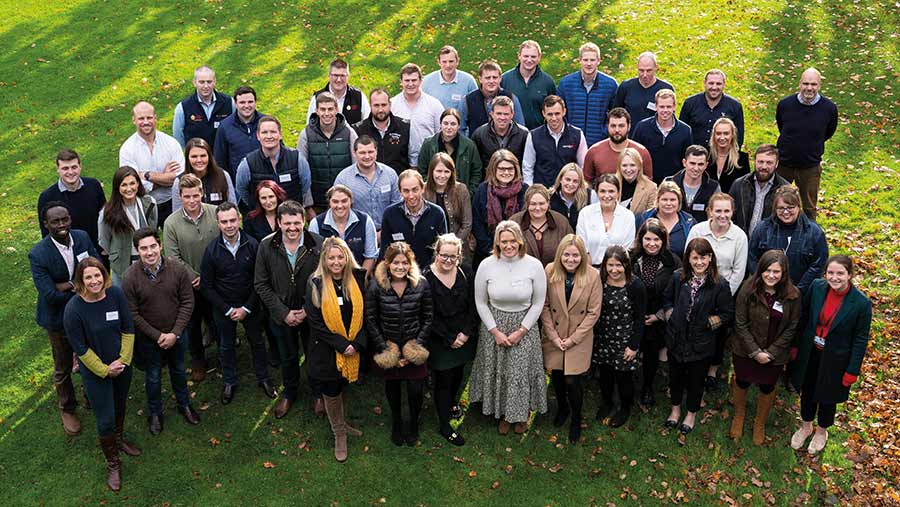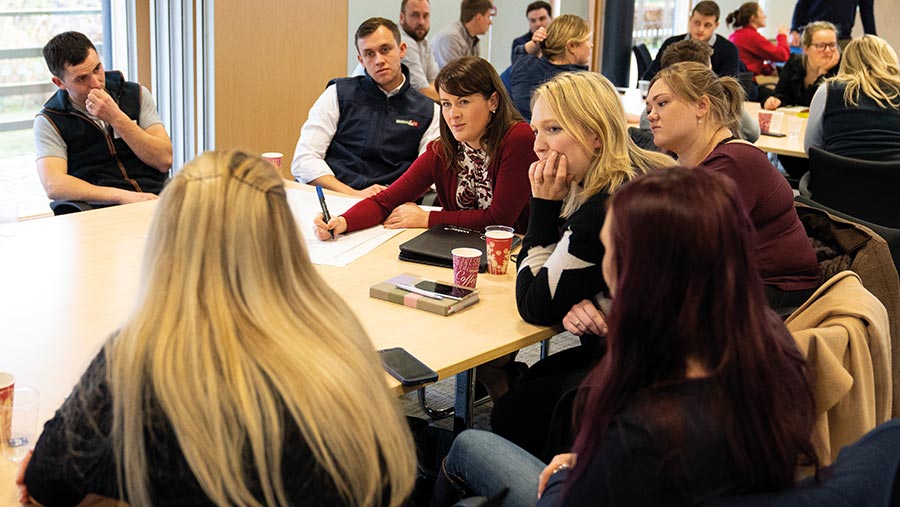Next generation conference urges young farmers to tell their stories
 © NFU
© NFU Young farmers have a vital role to play in telling their stories to the public to build more support for British food and farming, the NFU’s Next Generation Conference heard.
Members of the NFU’s Next Generation Forums from all four parts of the UK assembled for the first time in four years at Stoneleigh, Warwickshire this week.
Around 60 young farmers and growers shared their views on the future of the farming industry for the next generation, including access to land and finance, reaching net zero by 2040, and food and energy security.
See also: Why these farming heroes won NFU community awards
Summing up, NFU Next Generation forum chair Eveey Hunter told delegates among the main themes were the need for farmers to tell their powerful stories to the public and change how they market their products to adapt to new priorities in the cost-of-living crisis.
“Rather than just saying, ‘you need to be buying British’, you should be focusing on the fact that it’s local, sustainable, low food miles,” said Ms Hunter.
“So, we are really trying to tap into what they [the public] want to hear, not just because it is British – promoting for the right reasons. We have a great story to tell. I think the public and consumers do really want to hear that.”
Ms Hunter, an arable farmer in Hertfordshire, addressed delegates at the end of the two-day conference which welcomed guest speakers including NFU deputy president Tom Bradshaw, Anne Catherine from the European Council of Young Farmers (Ceja) and Susie Stannard from the AHDB.
Positive view
Ms Stannard, the AHDB’s consumer insight manager, said almost two-thirds of consumers (61%) have a positive view of British agriculture, according to a survey of 1,576 adults carried out this year by the levy body.
Meanwhile, 67% agree British farmers are doing a good job producing food and 51% proactively look for British food over imported goods, according to a YouGov survey of more than 3,000 adults carried out in August. Most respondents agreed farmers were not to blame for rising food costs.
Ms Hunter said the survey results were encouraging and she urged farmers to see this as a “big opportunity for us to try and market our produce properly”. She also highlighted the importance of farming TV documentaries, such as Clarkson’s Farm, in developing greater understanding of agriculture.
“We owe it to Jeremy Clarkson. Farming has been around forever and it has taken this [Clarkson’s Farm] for people to notice it,” said Ms Hunter.
“Kaleb [Cooper] is a great guy. But we all know there is a Kaleb in every county and on every farm. We all know someone who is our Kaleb, if you like. It has taken this programme for people to realise that.”
Future policy
Looking ahead, Ms Hunter said becoming more carbon efficient could help farming businesses to become more profitable.
A one-size-fits-all agricultural policy would not work in a country as diverse as the UK, she added. But there were “far too many schemes with unrealistic deadlines” and too many acronyms.
“Each union represented here will take their own course as far as policy is created. But ultimately, we have the same goal – to produce fantastic food for UK consumers.”
Jessica Williams, from the NFU Cymru Next Generation group, said: “While there are challenges on the horizon, we should never forget that farming delivers so much for people and communities.
“I firmly believe that our sector is in safe hands with so many engaged and dedicated farmers from all corners of the UK all striving towards the same shared goals.”
Vox pop: What are young farmers’ top concerns?
“Ag inflation is broadly higher than inflation figures in general. Prices for electricity, feed and fertiliser are sky high, which is very difficult to cope with. Longer term, making sure we get the future farming policy right will be very important.”
Matthew Steel, NFU Scotland Next Generation group chairman and arable and poultry farmer from Forfar, Angus
“We are facing a lot of challenges around the issue of veterinary medicines and are potentially going to lose up to 51% of them in Northern Ireland at the end of the grace period. That is a huge challenge around animal welfare, but also public health when we look at, for example, the loss of salmonella vaccines for poultry.”
Esther Skelly-Smith, sheep farmer from County Down
“The Welsh government must realise we need trees in the right places. We don’t want to take productive land out of production. I’m all for planting trees, but in the right place, using marginal areas to ensure we are not taking up valuable ground. On our farm, we’ve got steep slops and these would be perfect for planting trees.”
Ernie Richards, upland farmer, from near Hay-on-Wye, Powys


